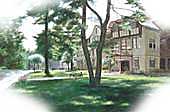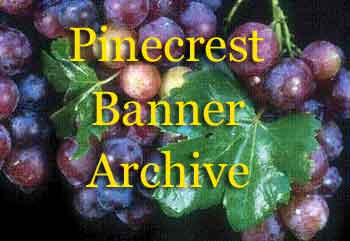Spring
2000
The
Spirit of Caleb
Nancy Corlett
"Because all those men which have seen My glory, and
My
miracles, which I did in Egypt and in the wilderness,
and have tempted Me now these ten times, and have not
hearkened to My voice; Surely they shall not see the
land which I sware unto their fathers, neither shall
any of them that provoked Me see it"
"But My servant Caleb, because he had another spirit
with him, and hath followed Me fully, him will I bring
into the land whereunto he went; and his seed shall
possess it" Num 14:22-24.
The Lord barred an entire generation from entering the Promised
Land because of their faint-heartedness and unbelief, in spite
of all that He had done for them. But there was a spiritual
quality that set Caleb apart, and he was allowed to enter.
We first meet Caleb in Num 13:2-6 when he is appointed one
of the spies sent to "search out the land." Caleb
represented Judah, the tribe of Praise and Worship, leading
Israel with songs of victory in the "high praises of
God in their mouth and a two edged sword in their hand"
(Psa. 149:6). Caleb was raised in this tradition.
When the spies testified that the land was all that was promised,
but that the people were too strong, Caleb said, "Let
us go up at once and possess it, for we are well able to overcome
it." But the people chose to listen to the others, and
rebelled.
Only Caleb and Joshua saw beyond that which their natural
eyes told them, to see with the eye of faith (Numbers 14:6-9).
Therefore, they received a promise that they would possess
the land (vs.24,30,37-38). In Deut. 1:36 the Lord added the
specific land that Caleb was to receive, "the land that
he hath trodden upon."
All this did not happen immediately. Before Caleb could enter
the land, he had to wander in the desert for 40 years with
his brethren. There are some things of God that we can enter
into individually, even though others do not, but there awaits
an inheritance for God's people that can only be entered into
corporately.
While waiting patiently for the Lord's plan to be worked
out, Caleb helped others fight their battles, even though
it was known they would not see the promised land. So also,
we are to pray for and minister to even those that we know
do not want the fullness of God.
Caleb did not complain, "It is not fair, I believed,
therefore, I should receive my portion now.” Instead,
he put his brother's needs ahead of even his own inheritance.
He was of a different spirit.
When the time came to divide the land, the tribes received
theirs by lot, content to take whatever God providentially
gave. But not Caleb, he went to Joshua and reminded him of
what God had promised.
But, again, this did not happen automatically. There was
more warfare to be done. Caleb said, "Give me this mountain."
Mountains represent obstacles and hindrances, and his description
of this mountain speaks of giants and fortified cities. But
those who "have the strength to war" and to drive
out the enemy with God's help, will find this is also the
place of the mountain-top experience.
And so Caleb received Hebron. Abram had settled there after
he separated from Lot. Later, David was anointed King and
reigned from Hebron for seven years. The significance for
us is that what had been a stronghold held by the enemy, became
a place of separation and friendship with God for those who
have a heart for Him.
The Canaanite name was Kirjath-Arba, the city of four giants.
Arba was of the Anakims, which means "choke". This
speaks of bondages which suffocate our very life. But we can
drive them out, if we have the spirit of Caleb. The very place
of oppression can become the place of the sweetest fellowship
to the overcomer.
After defeating the sons of Anak, Caleb asked for help in
taking the city of Kirjath-sepher. Although he still had the
strength to war, he was not too proud to ask for help. Finally,
after all this, he gave the city to the Levites, retaining
only the fields and villages.
This shows a generosity toward the support of the Lord's
ministry. We should ask ourselves, “Are we also willing
to give to others that for which we have waited so long for,
and struggled so hard for?” Caleb is definitely of another
spirit!
Joshua and Caleb represent opposite ends of the natural spectrum.
Joshua was the right-hand man of Moses, and Caleb was essentially
a "nobody." This points to the fact that the Lord's
promises are for everyone who believes.
These do not depend on who we are, what position we hold,
or even our calling in God, but solely on our trusting and
obeying, in the right spirit, a God who can and will deliver
what He promises.


